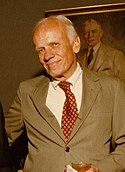Walker Percy Quote
Some years later, after Scott’s death, we came my father and I to the Field Museum, a long dismal peristyle dwindling away into the howling distance, and inside stood before a tableau of Stone Age Man, father mother and child crouched around an artificial ember in postures of minatory quiet—until, feeling my father’s eye on me, I turned and saw what he required of me—very special father and son we were that summer, he staking his everything this time on a perfect comradeship—and I, seeing in his eyes the terrible request, requiring from me his very life; I, through a child’s cool perversity or some atavistic recoil from an intimacy too intimate, turned him down, turned away, refused him what I knew I could not give.
Walker Percy
Some years later, after Scott’s death, we came my father and I to the Field Museum, a long dismal peristyle dwindling away into the howling distance, and inside stood before a tableau of Stone Age Man, father mother and child crouched around an artificial ember in postures of minatory quiet—until, feeling my father’s eye on me, I turned and saw what he required of me—very special father and son we were that summer, he staking his everything this time on a perfect comradeship—and I, seeing in his eyes the terrible request, requiring from me his very life; I, through a child’s cool perversity or some atavistic recoil from an intimacy too intimate, turned him down, turned away, refused him what I knew I could not give.
Related Quotes
About Walker Percy
Walker Percy, OblSB (May 28, 1916 – May 10, 1990) was an American writer whose interests included philosophy and semiotics. Percy is noted for his philosophical novels set in and around New Orleans; his first, The Moviegoer, won the National Book Award for Fiction.
Trained as a physician at Columbia University, Percy decided to become a writer after a bout of tuberculosis. He devoted his literary life to the exploration of "the dislocation of man in the modern age." His work displays a combination of existential questioning, Southern sensibility, and deep Catholic faith. He had a lifelong friendship with author and historian Shelby Foote and spent much of his life in Covington, Louisiana, where he died of prostate cancer in 1990.
Trained as a physician at Columbia University, Percy decided to become a writer after a bout of tuberculosis. He devoted his literary life to the exploration of "the dislocation of man in the modern age." His work displays a combination of existential questioning, Southern sensibility, and deep Catholic faith. He had a lifelong friendship with author and historian Shelby Foote and spent much of his life in Covington, Louisiana, where he died of prostate cancer in 1990.
